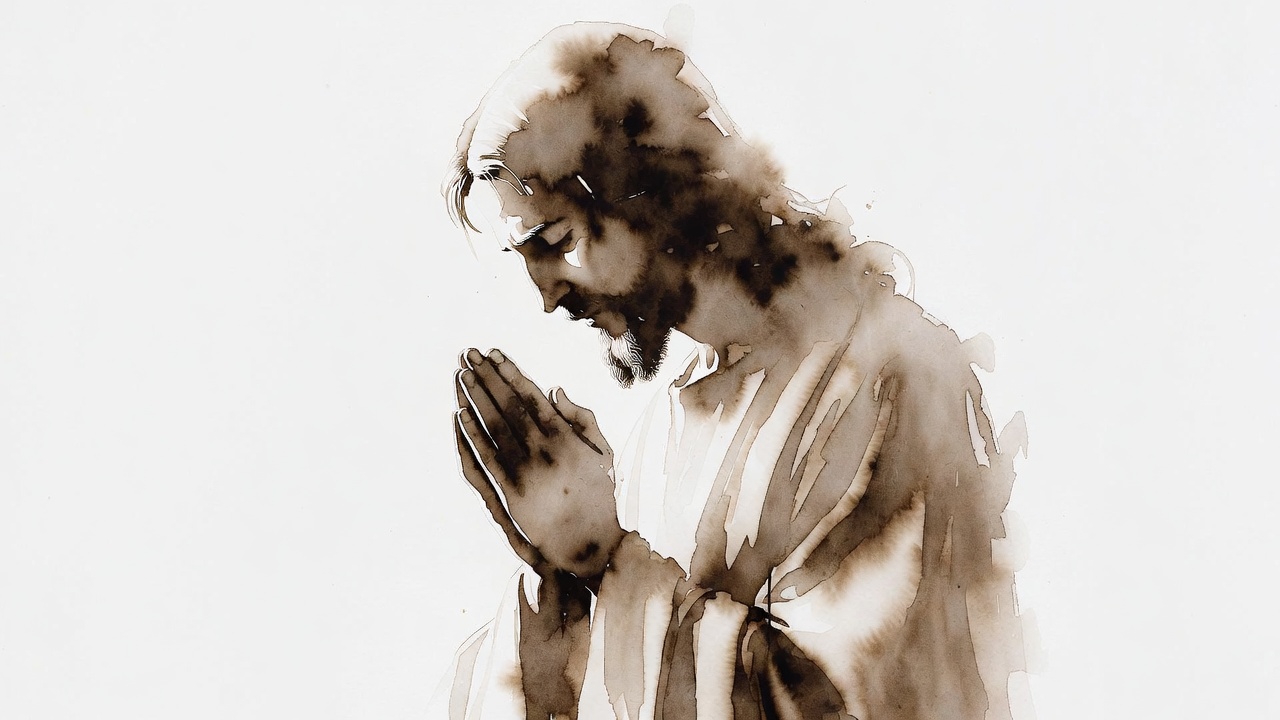Innocence, resilience and transformation
«The Strong Man»

Well-understood bioethics invites us to choose who we want to be with. Capra’s film with Harry Langdon in The Strong Man puts before us the sweet face of hope that comes from innocence.
Well-conceived bioethics today has the continuing need for an innocence that does not deny the truth
In the last contribution published on this website about the film Roe vs Wade (2021), Amparo Aygües rightly denounces the fallacies that I know are hidden behind the pro-abortion ideology[1]. Saint John Paul II warned of the crusade of death against life in his encyclical Evangelium Vitae in 1995. Recently, Pope Francis made statements in which he criticized the candidates for the presidency of the United States. He pointed out: “Both are against life, those who expel immigrants and those who kill children”[2]. He stressed with particular emphasis: “Abortion is killing a human being. Whether you like the word or not, it is killing. The Church does not close its eyes because it does not permit abortion, the Church does not permit abortion because it kills. It is murder, it is murder!”[3].
Well-conceived bioethics today continually needs an innocence that does not deny or close its eyes to scientific truths that uphold human dignity in all phases of life – from fertilization to unintended death – and in all economic, social and political circumstances – especially in situations of poverty, sexual exploitation of women, marginalization, vulnerability or exclusion. And at the same time, a resilience that is capable of resisting so much distortion of the truth, with the manifest hope that we can recover the moral texture in the face of the pressures of ideological fallacies.
All this will allow a transformation to take place. But let us not expect this change to come from those who consider themselves great and powerful in this world. Let us rather trust in silent victories that continue to occur everywhere and that are deliberately silenced. Because the unavoidable victory of love and life continues to reign in many hearts that decide well, in many contexts that joyfully confirm fidelity to the truth, in many committed actions that give their lives for others, rather than take it away. Without ideological barriers, without cultural exclusions.
A personalist cinema at the service of innocence and hope
A personalist cinema that we have been calling for in this section of the Observatory[4] speaks of all this. And today we are going to focus on the first film directed by one of the most significant directors of this way of understanding cinema, The Strong Man (1926)[5] by Frank Capra (1897-1991)[6], starring a comedian who is now quite forgotten, Harry Langdon (1884-1944), who in the Hispanic media was known as “Jaimito”.
It is a silent film whose main actor is for many “the fourth” of that stellar triad composed of Charles Chaplin, Buster Keaton[7] and Harold Lloyd. Capra tried to define the characterization of Harry Langdon well with respect to these geniuses of comedy. All three were masters of resilience, in that ability to overcome critical moments and adapt after experiencing some unusual and unexpected situation.
Chaplin got out of difficult situations by thinking; Keaton suffered them; Lloyd overcame them with speed. But Langdon was confident that he would emerge from adversity well and survive only with the help of God, or goodness… “The key to the proper use of Langdon is the “brick principle.” Langdon can be saved by the brick that falls on the policeman, but he is forbidden to in any way motivate the fall of that brick. [8]
This characterization of Langdon’s character was due, we insist, to Capra himself, and in this film it had its most complete expression. Before, the filmmaker born in Sicily had been involved in achieving it without the ultimate responsibility. In the immediately preceding film, Tramp, Tramp, Tramp (A Sportsman of Occasion, 1926) the director was Harry Edwards (1887-1952) and Langdon reveals many of these traits of innocence – particularly his complete and absolute infatuation with Betty Burton and a very young Joan Crawford (1906-1977) – but the argumentative coherence is scarce. In the immediately following film, the second and last one that Capra directed with Langdon, Long Pants (1927), there is a coherent story, but Langdon insisted on introducing dramatic and dark elements in his performance, which contradicted his genuine characterization, according to the Italian-born filmmaker.
The sphere of solidarity of those who are moved despite their discord and conflicts
«The Strong Man» tells the story of Paul Bergot (Harry Langdon), a Belgian soldier in the First World War. This war context already marks an early hint of the culture of death that was already established in the first great world conflagration. After newsreel shots of actions that show the reality of war, Bergot appears with his own childlike characterization. He changes the machine gun for the slingshot and thus repels his enemy in a bloodless manner. He only falls into his hands when he is distracted by reading the letters he has received from an American sweetheart, whom he only knows through this means and who is called Mary Brown.
Let us underline the eloquence of the scene: at the front, the soldier Bergot breaks with the logic of violence that should dominate him. The contextual injustice does not prevent the emergence of rebellion against what one is forced to live. When the German soldier (Arthur Thalasso), whom he has innocently shot with the slingshot, surprises Bergot, he carries him on his back to kidnap him almost as if playing. Capra seems to be telling us something on the screen that converges with what the phenomenologist Jan Patočka wrote years later: … the enemy is no longer an absolute obstacle in the path of the will for peace. He is not what is here to be eliminated. The enemy is a co-participant in this very situation, he is a co-discoverer of absolute freedom. He is the one with whom concord in discord is possible. He is a co-participant in the commotion, in the day, in peace and in life without this summit. Here the abysmal realm of “prayer for enemies” opens up, the phenomenon of “loving those who hate us”: it is the realm of solidarity of those who are moved despite their discord and conflicts.[9]
The confirmation of the solidarity of those who are moved is confirmed in the following scene. After the armistice that ended the First World War, the characters of Harry Langdon and Arthur Thalasso “emigrate to America, the land of promise” as we read on one of the explanatory signs. Capra here shows another life-threatening situation, such as the need to emigrate, which does not always find the receptive situation that would be expected at the destination. In short, he refers to the place where migrants are screened as “Ellis Island, the Funnel of America”. The former enemies form a small artistic company in which Thalasso is ‘Zandow the Great’, the cannon man, and Langdon is his assistant. The first will dedicate himself to looking for vaudeville agents to find work. The second… to Mary Brown.
The search for his beloved on the streets of New York will be a new way of certifying the innocence of Paul Bergot, who will experience different forms of rejection. A young woman threatens to call the police, a hotel concierge mocks him and points out that he knows Mary Brown, who walks by a nearby corner every day. The worst happens with a femme fatale who makes a living from crime, ‘Lily’ of Broadway (Gertrud Astor). She uses Bergot’s pocket to hide the loot when he is questioned by a policeman. When he tries to get it back, he realises that the jacket has holes in it and that the stolen goods are now in the lining. To get it back, Lily pretends to be Mary Brown and tries to seduce him into going to some apartments where she can take the garment from him.
The difference between beautiful love and the use of women
Paul Bergot soon realises that she is not his real love, and offers all kinds of resistance to play along. Some commentators see here a sign of sexual repression in Capra’s films. The observation could not be more wrong. Those who indulge in it do not want to differentiate between an innocent and clean love that seeks beautiful love in women in an integral way, and a flirtation or a relief that supposes only a momentary or fleeting use of feminine attractiveness. Paul Bergot knows the profound impact that Mary Brown’s letters have left on his soul, illuminating the deep night that was lived in the trenches of war. From there he easily discerns that this inner quality cannot be adequately expressed through a hasty exchange of pleasures.
The plot of the film takes place in a town called Cloverdale. In real life it is a small town in Sonoma County, California.
For McBride it is Hollywood itself[10]. Whatever the case, it will be the scene of what for Capra is the struggle that will characterize the development of American society. The choice between the total supremacy of money and the religious and transcendent values that allow the value and integrity of the human person to be maintained. The themes of It’s a Wonderful (1946), the famous Capra film that we associate with Christmas, are perfectly anticipated.
Cloverdale is a peaceful town that is threatened by a venue that defies the law. The old City Hall has been converted into ‘The Palace, Music Hall’, a place dedicated to vulgar spectacle, drink, gambling and prostitution… The signs declare: “Justice and decency had fled before the new law: money.” The gangster who runs the place, ‘Mike’ McDevitt (Robert McKim), arrogantly threatens the Protestant pastor who opposes him, Parson Brown, also called Holy Joe (William M. Mong): “It is useless to fight against me from now on. Money speaks louder than you.”
The pastor successfully calls together the parish community, who, forming a large group, surround ‘The Palace’ singing psalms. They move with the hope that moved Joshua and the people of Israel when the Lord tore down the walls of Jericho. Capra accentuates the providential parable character of the film when he shows that Parson Brown himself is the father of the real Mary Brown (Priscilla Bonner). The young woman did not write to Paul Bergot again when the war ended because she did not dare let him know her as she is, a blind girl. Without a doubt, an eloquent precedent to Charles Chaplin’s City Lights (1931)[11]. Capra tells it in an effective way: it is some children who are having a snack with her in a circle in the garden who ask her about her story. The presence of the children further accentuates the candor of Mary’s character.
The meeting that seemed impossible between two young people who loved each other»
While ‘Zandow the Great’ spends his time getting drunk at The Palace, Paul Bergot discovers that the girl who lives behind the church is Mary Brown. Capra manages to reach a peak of lyricism, sensitivity and modesty when he puts on screen the meeting between these young people who loved each other, and who seemed impossible that they could ever meet. The tenderness with which Bergot welcomes Mary’s blindness is only surpassed by the laughter they share later when he tells her about his adventures with the women who seemed to be her or who wanted to replace her. The fruit of true communion of souls is unmistakably joy.
The film’s denouement comes through a long scene. Paul is forced to replace ‘Zandow the Great’ because of his drunken state. He improvises with wit. When he sees the parishioners surrounding the premises, he thinks it is a funeral and asks the enraged public to be quiet. When they mock and hope that Mary Brown will be forced to entertain them in the brothel they have set up at The Palace, Bergot brings out his best genius and energy. With the help of his weakness, he is able to dominate the degenerate spectators from a trapeze and with cannon shells knock down the walls of The Palace. Pastor Brown and his parishioners see that the Lord’s promise has been fulfilled, and that the walls of Jericho have fallen.
In the film’s epilogue, Paul Bergot is seen dressed as a policeman, guarantor of the majesty of the law in a now regenerated Cloverdale. He tells his wife that he is going home, that he does not need her to patrol the streets. As he turns around, however, he trips over a stone, and thanks to Mary he is able to get up. The weakness of the one who is now his wife turns out to be her strength. He has not lost his innocence. He has made her his bastion.
Conclusion
Innocence and resilience remain indispensable in our day and age. The problem is that Cloverdale and its plots, against the true human good, continue to be rampant in our so-called society of communication and freedom, especially in its social networks. A few weeks ago, Dr. Carola Minguet Civera wrote in Religión Confidencial, in a significant Tribune entitled Porn is now official on Twitter (I).
There are studies that warn of pornography as a cause and incentive for criminal behavior such as sexual assault, even pedophilia. The business, in many cases criminal, of those who make it possible has also been denounced. Thus, there is no endorsement for Musk to jump on the bandwagon, much less freedom of expression. This argument is absolutely hypocritical. The reason is that he is going to pocket many millions, while so many lives are broken.[12]
Well-understood bioethics invites us to choose who we want to be with. Capra’s film with Harry Langdon in The Strong Man brings before us the sweet face of hope that comes from innocence. Let us not stop working with this indestructible conviction.
Jose Alfredo Peris-Cancio – Professor and researcher in Philosophy and Cinema – Member of the Bioethics Observatory – Catholic University of Valencia
***
[1] https://www.observatoriobioetica.org/2024/09/el-grito-silencioso-las-falacias-tras-la-ideologia-abortista/10002305
[2] https://religion.elconfidencialdigital.com/articulo/vaticano/papa-francisco/20240914000000050203.html#google_vignette
[3] Ibidem.
[4] We have explained this notion of filmic personalism in detail in various places. Let us refer to it on the occasion of the reflections we made regarding a contemporary filmmaker like Aki Kaurismäki, in an article that is in Open Access: Peris-Cancio, J.-A., & Oliver-del Olmo, E. (2023). A proposal for the philosophical reading of Aki Kaurismäki’s cinema: the filmic personalism of the loser (loser) who expresses her dignity with love and friendship. Ayllu-Siaf, 5(2 (July-December), 197-237. doi:10.52016/Ayllu-Siaf.2023.5.2.7
[5] A first commentary on this film can be found in volume 02 of the Notebooks of Philosophy and Cinema, Sanmartín Esplugues, J., & Peris-Cancio, J.-A. (2017b). Notebooks of Philosophy and Cinema 02. The personalist principles in the filmography of Frank Capra. Valencia: Catholic University of Valencia, San Vicente Mártir, pp. 26-30. Also in the José Sanmartín Esplugues Philosophical Research Network, https://proyectoscio.ucv.es/actualidad/12188/
[6] There are various videos on YouTube about the film. We believe that the most complete one is the one you see in this link, English:https://www.youtube.com/watch?v=rnHWKUfXgtY&t=3s
[7] On the characters of Chaplin and Keaton, cf. Pavía-Cogollos, J. (2005). El cuerpo y el comediante: Chaplin y Keaton. Valencia: Editorial de la UPV.
[8] Capra, F. (2007). Frank Capra. El nombre antes del título. Madrid: T&B Editores. The American film critic and historian Joseph McBride wrote a biography of the American director, continually questioning Capra’s statements, many of them unfair and debatable. In this section, however, they are rather nuances that do not contradict the sense of Capra’s intention when characterizing Harry Langdon. Cfr. McBride, J. (2000). Frank Capra: The Catastrophe of Success, New York. New York: Simon & Schuster Inc., pp. 119-123. 153-171.
[9] Patočka, J. (2016). Heretical Essays on the Philosophy of History. Preface by Paul Ricœur. (I. Ortega Rodríguez, Trans.) Madrid: Encuentro, p. 185.
[10] Op. cit., p. 161.
[11] McBride also considers this to be the case, op. cit. p. 162.
[12] https://religion.elconfidencialdigital.com/opinion/carola-minguet-civera/porno-es-oficial-twitter-i/20240618031841049592.html. It continues in a second part, Porn is now official on Twitter (II), https://religion.elconfidencialdigital.com/opinion/carola-minguet-civera/porno-es-oficial-twitter-ii/20240625035821049642.html#comentarios-49642, in which she elaborates on the same complaint: “Sexual degradation is a downward staircase that has always existed, the problem is that, from a tool integrated into everyday life like this social network, people are going to be pushed to roll down it. What X is going to facilitate, therefore, is not autonomy, freedom, creation… but, simply, that more and more people crash into the ground.”
Related

Being for Others: Saint John Paul II’s Vision of the Gift in Creation and Human Relations
Francisco Bobadilla
23 February, 2026
3 min

When Retreat Becomes Creation
Exaudi Staff
23 February, 2026
3 min

Domine, ¿Quo Vadis?
Rosa Montenegro
23 February, 2026
4 min

The Economy of Women’s Impact
Exaudi Staff
20 February, 2026
3 min
 (EN)
(EN)
 (ES)
(ES)
 (IT)
(IT)


